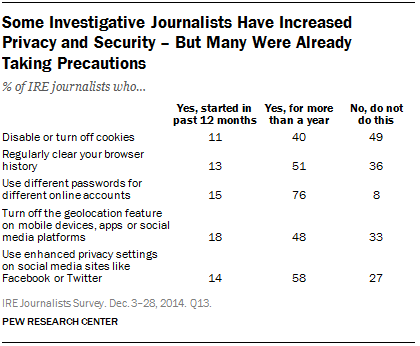The American public has had a muted response when it comes to concerns about possible government monitoring of their digital behavior, and many have not yet adopted – or are even aware of – many of the tools available to protect their online privacy and security, according to a new Pew Research Center study.
But it is a different story for a group like investigative journalists, whose work makes them potential targets for monitoring.

In our survey of U.S. members of Investigative Reporters & Editors, most of the investigative journalists assume that they are being monitored because of the nature of their work: 64% believe that the government probably collected their communications data.
And many have long since adopted various privacy and security measures. Most notably, 76% of the investigative journalists said they had been using a variety of passwords for more than a year, and 58% had been using enhanced privacy settings on social networking sites.
In addition, 59% of IRE reporters (a subset of the larger group of journalists) say that, to protect sources’ anonymity, they meet in person instead of using electronic communication – a decidedly non-digital form of security. Nearly half (48%) have done so for more than a year.
For this group of investigative journalists, there is far more concern about decreasing resources in newsrooms – the top-ranked issue they feel the profession is facing today.
In a different set of questions asked of the general public, 52% said they were very or somewhat concerned about government surveillance of Americans’ data and electronic communications, but a significant share – 46% – expressed little or no concern.
For those Americans who had heard about the surveillance programs, a minority had made any of the behavior changes included in the survey. Fewer than on-in-five who had heard about the programs reported changing privacy settings on social media (17%), avoiding using certain apps (15%), using social media less often (15%), speaking more in person than online or over the phone (14%), uninstalling certain apps (13%), avoiding the use of certain terms in online communication (13%), avoiding the use of some terms in search engine queries (11%), deleting social media accounts (8%), or making more phone calls instead of communicating online (8%). Overall, one-in-three (34%) who had heard about the programs say they have changed at least one of these behaviors since learning about the government monitoring programs.
[there’s a]
